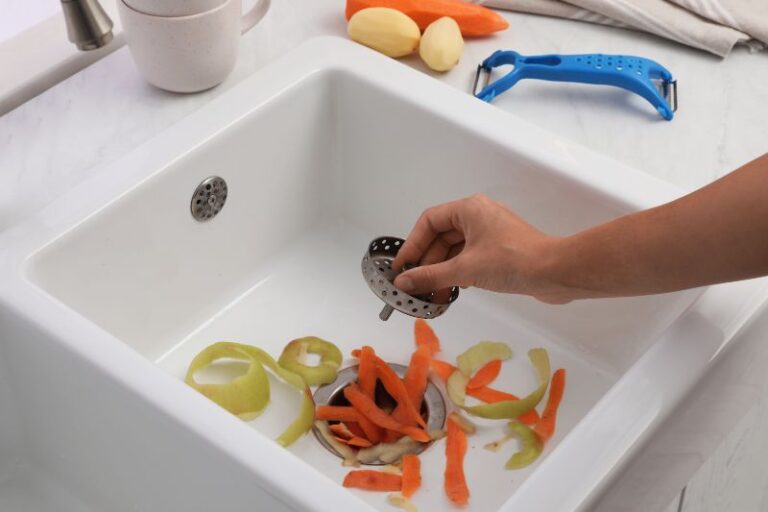
It’s easy to assume the garbage disposal can “dispose all,” but this simply isn’t true. To avoid a plumbing disaster, think twice before rinsing your plate in the kitchen sink. Are you unsure which foods are not allowed down the drain? Consider the top 10 things most likely to damage your garbage disposal or clog the drain. Then, discover how to fix a broken garbage disposal and other tips to keep this appliance working properly.
What to Never Put down the Garbage Disposal
- Grease and oil: This is the number one thing to keep out of any drain. Used cooking grease may be liquid when it’s hot, but it solidifies into a gelatinous glob as it cools. Even if you rinse grease down the drain with hot water, it will harden and cause problems further down the sewer line. To avoid this, properly dispose of oil by pouring it into an old can or jar, letting it harden, and tossing it in the trash.
- Coffee grounds: If too many coffee grounds go down the kitchen sink, you’ll end up with a thick paste that can slow or clog the drain. You’re better off disposing of coffee grounds in a compost bin or using them in your garden.
- Nuts: Do you know how peanut butter is made? Nuts are put into a grinder, where they’re mashed into a thick, sticky paste. Limit the number of nuts that drop into the disposal to avoid a peanut butter-like buildup in your pipes.
- Eggshells: Don’t fall for the rumor that eggshells are good for garbage disposals because they sharpen the blades. First of all, disposals use impellers, not blades, to grind up food scraps. Second, the membrane layers of an eggshell can wrap around the shredder ring and potentially damage the disposal. And third, the sand-like consistency of ground-up eggshells can clog your pipes. Do your plumbing a favor by dumping eggshells in the trash or adding them to your compost pile.
- Fibrous foods: The stringy nature of fibrous foods can potentially damage garbage disposals. Because of this, you should throw away corn husks, carrot and potato peels, onion skins, celery and asparagus stalks, pumpkin innards, and artichoke leaves instead of rinsing them down the sink.
- Starchy foods: Think about what happens when you overcook pasta, rice, potatoes, legumes, or oatmeal. They turn into a paste-like substance capable of clogging the kitchen drain. Scrapping a few scraps into the sink won’t hurt, but don’t dispose of entire servings of macaroni and cheese in the garbage disposal.
- Hard materials: Some items are just too hard for a disposal to handle, including animal bones, fruit pits, seeds, and walnut shells. Keep these materials clear of the kitchen sink, or the disposal will make a racket every time you run it.
- Trash: Never put non-food items down the drain, including twist ties, rubber bands, string, plastic wrappers, cigarette butts, bottle caps, and plant clippings. In short, if it’s not edible, it shouldn’t go down the disposal.
- Paint: Do-it-yourselfers may be guilty of rinsing paint brushes or even pouring leftover paint straight down the drain. Not only does paint cling to the side of the drain, but disposing of it this way can create environmental concerns. Buy a conservative amount of paint to reduce waste, and dispose of any leftovers properly.
- Harsh cleaning chemicals: Dish soap and household cleaners are acceptable, but harsh drain opener, lye, and other chemical cleaners are not appropriate for the kitchen sink. If the drain becomes clogged and the disposal isn’t working, call a plumber for help.
How to Fix a Broken Garbage Disposal
Even a well-cared-for garbage disposal may stop working from time to time. Attempt these troubleshooting tips the next time your garbage disposal breaks.
- The garbage disposal won’t turn on: Look below the sink to make sure the appliance is plugged in. Check for a tripped circuit breaker as well. Then, try pressing the reset button on the base of the disposal.
- The garbage disposal is jammed: Do you hear a buzzing sound, but the disposal doesn’t operate? This means the impellers are jammed. The easiest way to free up a jam is to insert a 1/4-inch hex wrench into the bottom of the unit and twist it around. You can also unplug the disposal and stick a broom handle into the drain to dislodge whatever caused the jam.
- The garbage disposal is leaking: Unplug the appliance and check for loose bolts. Tighten any you find. If the leak continues, cover the bolt heads with plumber’s putty to create a watertight seal.
- The garbage disposal grinds poorly: If your unit doesn’t do a good job, the impellers could be wearing out. These are often fastened with rivets and are not designed for easy replacement. In this case, it’s usually best to replace the entire garbage disposal.
More Garbage Disposal Tips
If your garbage disposal is running smoothly, and you want to keep it that way, follow these tips:
- Dispose of permitted foods in small amounts to avoid overloading the disposal.
- Run cold water before, during, and after running the garbage disposal to help flush the debris down the drain.
- Run a handful of ice cubes, a squirt of dish soap, and a few lemon, lime, or orange peels through the disposal to keep your drain smelling fresh.
- Buy a special brush to remove hard-to-reach food buildup inside the garbage disposal. This keeps things running smoothly and removes unpleasant odors.
Schedule Garbage Disposal Repair in Fort Collins
Is your garbage disposal acting up? Do you want to install a garbage disposal for the first time? Either way, Allen Service can help. Choose us for garbage disposal repair, replacement, or installation, and you’ll receive affordable, reliable services you can trust. We have served the Fort Collins area for over 60 years and would be delighted to make you our next satisfied customer! Call us at 970-672-1660 or contact us online to request a service estimate.
